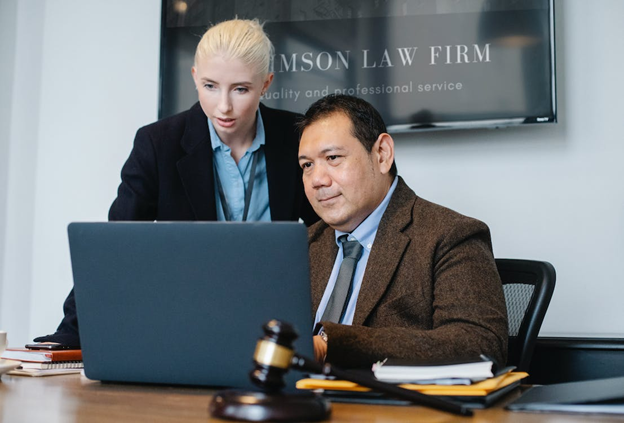When it comes to hiring a lawyer, there’s no substitute for doing your research. Hiring the wrong lawyer can be expensive and damaging to your case. It’s important that you take the time to ensure that any potential lawyer is qualified and experienced in handling cases like yours before signing on the dotted line. Fortunately, there are several ways you can research and verify a lawyer’s credentials. In this article, we will outline how to go about researching and verifying a lawyer’s qualifications so you can make an informed decision when selecting legal representation.

1. Check State Bar Association Website:
Each state has its own bar association website that provides detailed background information about lawyers in the area. This can include license and disciplinary history, areas of practice, education, and more. In addition, many bar associations also feature online lawyer directories that let you search for attorneys based on location and practice area. This is an excellent way to narrow down your list of potential lawyers and make sure they have the right credentials for your case. For example, if you want to hire criminal lawyers in Adelaide then make sure to check the website of the Law Society of South Australia. This website will provide you with a list of qualified, experienced criminal lawyers in the area.
2. Conduct an Online Search:
A simple online search for any potential lawyer can yield useful information about their background and qualifications. Sites like Yelp, Google Reviews, and Avvo allow users to post reviews and ratings of attorneys, giving you real-world insight into how they operate and what kind of services they offer. You can also visit the lawyer’s website or LinkedIn profile to view their credentials and read through articles they have written on legal topics related to your case.
3. Ask Friends & Family:
Word-of-mouth recommendations are invaluable when it comes to finding a great lawyer. If you know anyone who has had experience working with attorneys in the past, ask them for their opinion on who would be the best fit for your case. This is a great way to get an unbiased opinion about potential lawyers and determine which one is most suitable for your needs. Additionally, many attorneys offer free consultation services, so you can get a sense of how they would handle your case before making a decision. For example, lawyers may offer free consultations before you commit to hiring them.
4. Interview Prospective Lawyers:
It’s always wise to interview any prospective lawyers before making a decision. Ask each lawyer questions related to their experience handling cases like yours, how they plan on addressing your legal issue, and what kind of fees they charge. During this process, make sure you are comfortable with the lawyer’s answers and that you trust them to handle your case effectively. Also, don’t be afraid to ask for references from former clients. This can help you gain an even better understanding of a lawyer’s track record and whether or not they are the right fit for your case.
5. Ask for Referrals:
Getting a referral from someone you trust is one of the best ways to find qualified legal representation. Reach out to family and friends, co-workers, or even other lawyers who may be able to provide a recommendation. You can also ask your state bar association if they have any recommendations or can put you in touch with local specialized lawyers like criminal defense lawyers in Melbourne or estate planning attorneys in Sydney. This is an excellent way to ensure that you are getting the best representation for your case. Also, many lawyers offer discounts or reduced fees for referrals from their existing clients.
6. Read Reviews and Testimonials:
Reading reviews and testimonials from past clients is an excellent way to help you make your decision. Look up the lawyer’s website or social media accounts to find these reviews, or search for their name on third-party review sites like Yelp and Google Reviews. These will give you a better understanding of how they handle cases and what kind of results they have achieved in the past. It’s also a great idea to read through any articles or blog posts written by the lawyer to get an even deeper insight into their experience and qualifications.
6. Use Legal Resources:
Use legal resources to find the best lawyer for your needs. Many states and cities have online directories of lawyers that list practitioners’ background information, practice areas, and contact details. This can be a great starting point for finding qualified attorneys in your area who specializes in your particular type of case. Additionally, you can take advantage of websites like Avvo or Justia which provide access to helpful ratings and reviews from past clients. For example, Avvo offers ratings and reviews of attorneys, as well as video interviews with lawyers to give potential clients an idea of what they’re like and how they work.
7. Compare Fees:
Finally, compare the fees of various lawyers before making a decision. Different attorneys will charge different rates for their services, so it’s important to shop around and get an idea of what you can expect to pay. Also, be sure to read through any contracts or fee agreements carefully before signing anything. That way, you can make sure that you understand all of the details of your agreement and won’t have any surprises down the road.

Finding the right lawyer for your legal needs can be a daunting task. However, with these tips and resources, you’ll be able to find an experienced attorney who is qualified to handle your case effectively. Make sure that you read reviews and ask questions during interviews so that you are confident in your decision before signing any contracts or agreements. Don’t forget to compare fees from different lawyers as well – this will help ensure that you get the best representation at the most reasonable price. With just a bit of research and preparation, you’ll be on your way toward finding quality legal counsel for whatever situation may arise!

